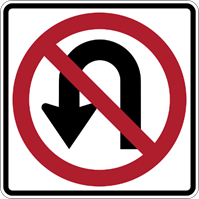
A “U-turn” is the act of performing a 180-degree rotation of a motor vehicle on a public road to reverse the direction of motion. As a motorist, it can be jarring to watch another vehicle suddenly slow down, cross the median, completely change direction and proceed down the opposite side of the road. This maneuver can be dangerous because it is generally unexpected by other drivers. However, it is technically legal to make a U-turn on a public road in Michigan. In fact, the U-turn is not mentioned whatsoever in the Michigan Vehicle Code.
The legality of the U-turn depends on the driver’s compliance with other aspects of the law while performing the maneuver. For the purposes of this discussion, U-turns do not include roundabouts or a turnaround lane on a divided highway (commonly referred to as a “Michigan Left”). The following are aspects of Michigan law affecting U-turns:
- Traffic Signs Must Be Obeyed: A posted sign prohibiting a U-turn for that particular road must be followed. MCL 257.611(1) provides that “[t]he driver of a vehicle or operator of a streetcar shall not disobey the instructions of a traffic control device placed in accordance with this chapter unless at the time otherwise directed by a police officer.” Failure to obey the traffic sign will cause the driver to be responsible for a civil infraction.
- Traffic In The Opposite Direction Must Be Undisturbed: A U-turn performed in a manner that causes oncoming traffic in the other direction to slow down or stop could amount to a traffic violation. MCL 257.676b(1) provides that “a person, without authority, shall not block, obstruct, impede, or otherwise interfere with the normal flow of vehicular or pedestrian traffic upon a public street or highway in this state, by means of a barricade, object, or device, or with his or her person.” Impeding traffic may cause the driver to be responsible for a civil infraction.
- Turn Signals Must Be Utilized: MCL 257.648(1) provides that “[t]he operator of a vehicle or bicycle upon a highway, before stopping or turning from a direct line, shall first determine that the stopping or turning can be made in safety and shall give a signal as required in this section”. This can be accomplished by the appropriate hand signal or a mechanical signal device on the motor vehicle. Failure to use turn signals will cause the driver to be responsible for a civil infraction.
- Illegal U-Turns At Intersections: MCL 257.647(1)(b) provides that a driver intending to turn left at an intersection shall do as follows: “Approach for a left turn shall be made in that portion of the right half of the roadway nearest the center line in a manner as not to interfere with the progress of any streetcar, and after entering the intersection the left turn shall be made so as to leave the intersection to the right of the center line of the roadway being entered.” So when a vehicle turns left at an intersection, it must enter from the right of the center line then, after the left turn, leave the intersection on the right of the center of the road entered upon. If the vehicle continued to turn left as to leave in the opposite direction of the intersection approach, then the U-turn would be illegal because the vehicle did not leave the intersection on the first right of center lane of the road that it entered.
- U-Turns Made Illegal By Local Ordinance: Although state law does not ban U-turns, the maneuver might be legal in the particular Michigan city, village or township that you are driving in. The municipality may have adopted Rule 434 of the Uniform Traffic Code which states as follows:
-
-
- (1) “The driver of any vehicle shall not turn the vehicle so as to proceed in the opposite direction on any street in a business district and shall not, on any other street, so turn a vehicle unless the movement can be made in safety and without interfering with other traffic.”
- (2) “A person who violates this rule is responsible for a civil infraction.”
-
Be sure to check all signs or review local ordinances and rules before assuming that it is safe and legal to execute a U-turn.
In sum, the legality of your U-turn is dependent on the individual facts and circumstances when it is made. An improper U-turn may also result in 2 points added to your driver’s license due to a moving violation. If you have additional questions about U-turns or any other aspect of Michigan traffic law, do not hesitate to contact the attorneys at Kershaw, Vititoe & Jedinak PLC.





